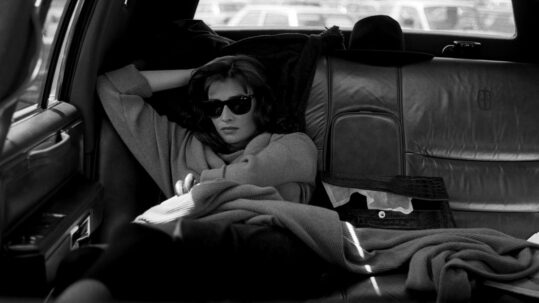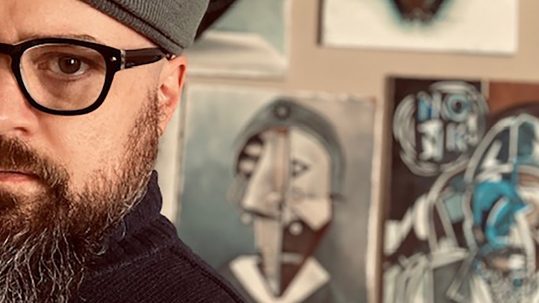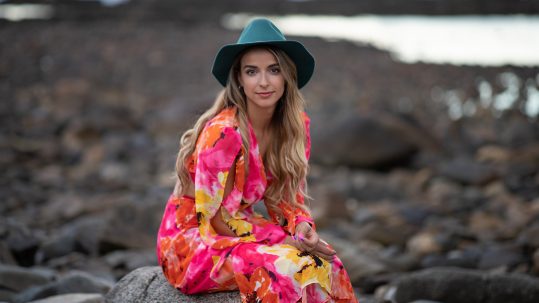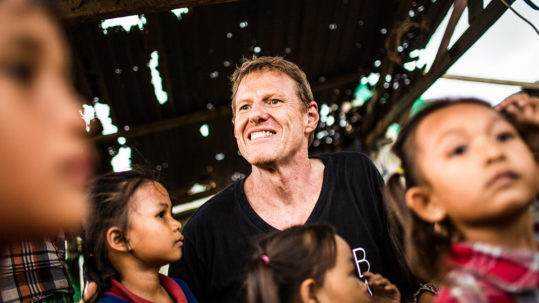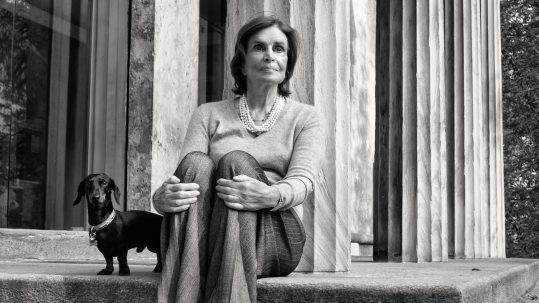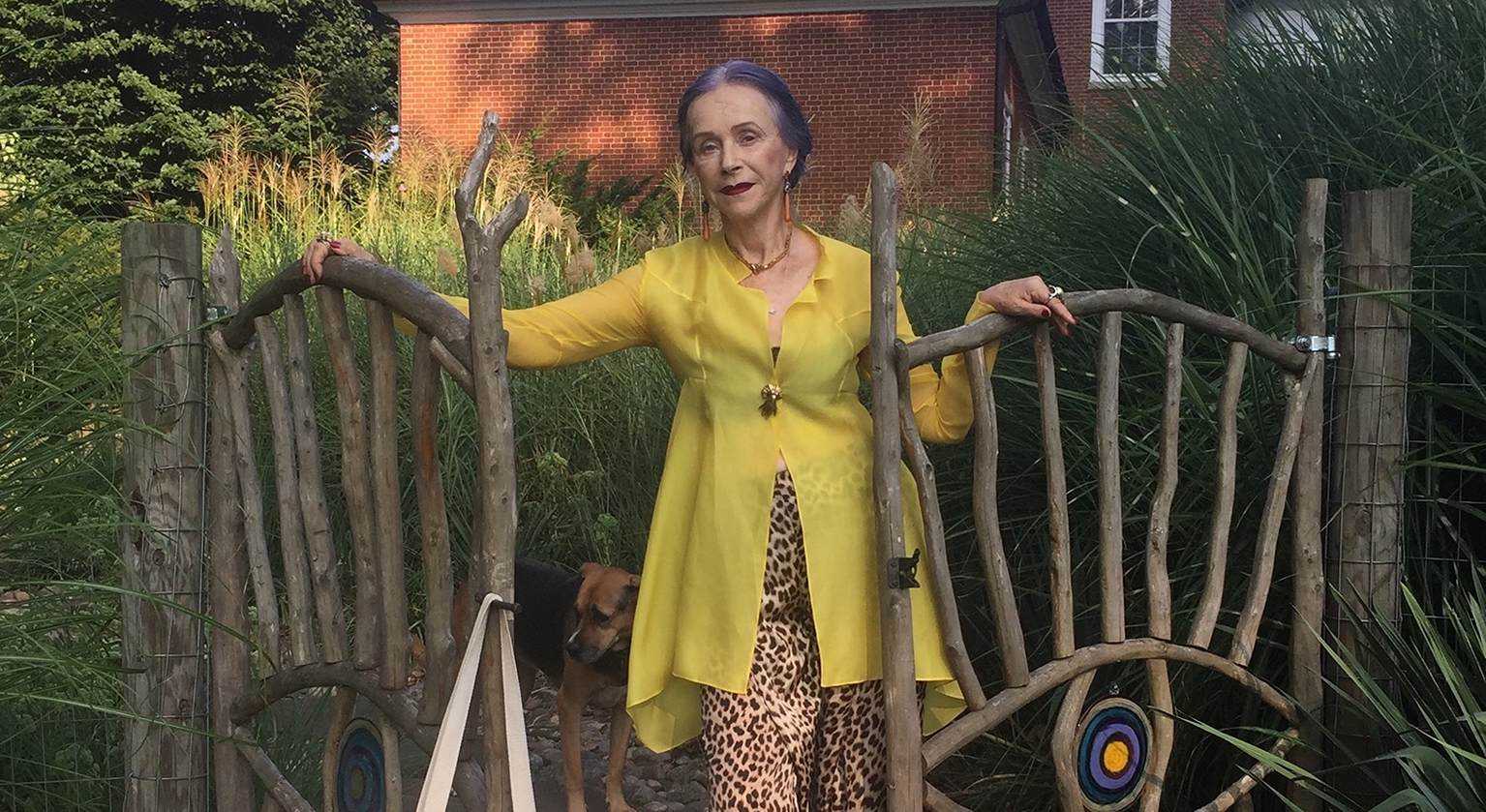
04 Oct Beatrix Ost
Photo: Courtesy of Beatrix Ost
BEATRIX OST
Global icon, fashion authority, writer, painter, Beatrix Ost is a collector of all those precious moments that make life a little more enjoyable. Like a breath of fresh air, Beatrix Ost’s timeless beauty is an invariable inspiration to the world. A talk with a Lady of our time.
By Victoria Adelaide | OCT 23. 2017
Victoria Adelaide: Everything about you seems to be an ‘art form’. The way you dress, the way you speak, the way you think, your food? Where does it come from?
Beatrix Ost: Interesting that you say that because when I was a very young girl, I was already expressing myself in a very unique way. It also comes from growing up after the war, when there was nothing to be had, you couldn’t buy shoes or dresses, there were not many stores. There wasn’t anything, things had to be reinvented. From the very beginning, I knew how I wanted to look, and how I wanted my world around me, but I had to invent it myself. So, it was like a self-invention from very early on. In my two books I wrote about it, how I wore my father’s tie around my waist, to make it permanent, so it looked like a belt and my parents always thought I was funny. Nobody said anything about a good look or anything, everybody always thought, ‘Oh Beatrix she’s so funny, she is so interesting’. I think this was a good thing to grow up with; I was praised for being myself, for being me.
VA: Most importantly where does your love for turbans come from?
BO: After the war, they were cleaning up for years. The debris of the war, the ‘Trümmer Frauen’ as we say in German, it was the women who cleaned up the debris from the bombs. They were wearing turbans; it was something in the 50s, people were wearing turbans, maybe I got it from them. I just discovered it as ‘Chic’. Maybe from that time, from Dior fashion show in 54, 55; I was invited to go to Florence and model the first fashion show there, and I think from that time on, maybe I saw something I liked…
VA: What inspires you to dress in the morning?
BO: It’s quite easy; on a perfect day I go for a very early walk with my dogs. By the time I come home, I exercise and then I pretty much know where I will go. If I have a day when I’m going to be sporty, I wear something sporty; when I know I’m going to hang out in town for a couple of hours because I have a dinner, then I already dress for dinner. This is also my life here in the Countryside; I’m partly living on a farm. New York is a different story, you pretty much dress around 11 for the evening because you go way downtown and you don’t want to come back uptown to change, you know that and a lot of things.
VA: A lot of people have multiple talents but they always seem to have a hard time channeling them. How do you manage to exhibit all of your skills at their best with international recognition?
BO: Well, I always was an artist, but what makes me feel the most proud are my books. The writing, which is very recent; I started to write only 15 years ago. I’m very proud about that, because I taught myself how to write a fascinating story. They are mostly centered around my experiences, my life itself, and I also always find that everybody has an interesting life. Life is interesting in itself, we just think it’s more interesting when we can spend a lot of money being on a boat in the Mediterranean, going to a fashionable something; it’s also interesting when you do very small things. It’s also interesting to cook at home. To do something new. I love cooking, it’s like meditation.
VA: Writing is your most recent form of art. Do you think you could have done it before or did you need to live more in order to write?
BO: Yes, you’re right. I think it came to me at the right moment when I had already lived quite a bit of an interesting life. ‘The Philosopher Style’ is very much my book to you about things we all have inside of us or we are all interested in, but we often don’t think about it or we don’t know it. I just collected all these thoughts and wrote about it. I also wanted to become a good listener. I had a little brooch made by a jeweler and I would put it on at night when I would go out, beautifully dressed. I would go to a party and somebody would approach me; we’d start talking and I would point at my brooch and it said, ‘Practicing Silence’. So, I was practicing silence while I was in a room filled with party people. I learned to listen in a way, it was fascinating. I would not talk; I would just be there and I would listen, listen, listen. Part of the book ‘The Philosopher Style’, has to do with this ability to listen and look at other people and in other people’s lives, what they have to say, what they do and what they think. In the book, I also have forty interviews, a person who came back from the war with three limbs missing, a woman in a wheel chair, a beautiful model, a brain surgeon who is blind in one eye. I found these people so fascinating, they had topped life in a way one wouldn’t imagine. I think the base was wanting to be a listener and that was a good tool, this little brooch, to put that brooch on, pointing at it and not talking, because talking takes all the energy away from listening.
VA: When Robert Thurman compares you to Proust, how does it feel?
BO: It’s wow! ‘Wow’, I said to him! He said, ‘Yes this is how it is, I wouldn’t write it if I did not feel it’. It was wonderful.
VA: Your motto ‘In your body is a good place to be’. Did you always felt that way or did you create the motto because at some point you were a seeker and you got to this place?
BO: It came through my youngest son; through him I was introduced to Buddhism. He is a reincarnate from Tibet. I became interested in Tibetan Buddhism, and that’s how I met Robert Thurman and we started traveling with him. From then on, I practiced being in the ‘now’, being in this moment and you know in this moment, your house is your body, there is no other. If you are in this now, you are in your body. Only other things change, but your body is your body forever. This is the gift you have been born with, you have to be very careful with it, you have to love it, cherish it, be good to it, exercise your body. This is the moment, and the house of the moment is your body. I figured it out for myself, I put it on a wall in my apartment, and one day someone saw it and then it became more than just for me. Yes, that’s how it started. I think it has a lot of truth, I haven’t found a better explanation than this.
VA: You wrote, ’I have to retreat into my citadel of innocence looking for solutions to find and search answers’. Did you find your answers at this stage of your life and what were the questions?
BO: Oh, I’ll tell you something, I am still searching (laughs)! Every day, I’m still in front of a big river, I am still completely searching. I’m changing my life right now. I parted ways with my husband of over forty years but in friendship. We see each other all the time and we are friends, but I have started living my very own life and it’s all brand new to me, I’m fascinated by this newness; I feel like a teenager, that’s crazy.
VA: You probably are ‘a teenager’ if this is how you feel, age is a number isn’t it?
BO: Yes, yes, I couldn’t tell you that there is something finished. Everything is in question mode, a question gets answered and another question comes up, it’s always like that. There is nothing ever really done. We also have so much fear and I’m not excluded. Sometimes I don’t know where this will lead… at one point I go back into my ‘citadel’, which is my body and my mind, and I try to be still. When I’m still, I can also listen to myself.
VA: Do you think the imposing figure of your father shaped your character?
BO: I think so. He was very realistic, he was very clear. Things were as they were. Life was what it was; we had to have a clear mind and he was very kind. They also let me be who I wanted to be. I wasn’t told you can’t do that and I think that is very helpful.
VA: What is a typical day in the life of Beatrix Ost? Or is there any typical day at all?
BO: Well, I would carve out several hours working on something; right now, it’s writing more than doing any other art related activity. Exercise, being with friends, with my family, it’s very important to me, with good people. I think the art of friendship is a strong part of my day. I don’t have a rhythm because I don’t have a job where I would go every day. So, I have my very own rhythm, inspiration and also, I like to cook for a group of people I invite.
VA: How would you define yourself, your style if that’s possible?
BO: Well, it’s just so easy for me to be dressed like that. I remember Gauthier, opening a shop in Manhattan thirty years ago; they had all those incredibly interesting clothes and they would put things at the back and give them to me. Sometimes it was a gift, sometimes I had to pay, so I would wear them, I would be like a walking PR. Or Yamamoto; I knew people who had Yamamoto in their store, and they would say, ‘Beatrix there is something just for you; we put it aside, look at it’. Also, when you start adoring the clothes you buy, it’s forever, you just wear it until it falls apart, which obviously I also like when there’s tiny little holes, I don’t mind. Elegance is something which doesn’t go with seasons, it’s for you; what you chose 10 years ago is still fabulous today. This is how I feel. Fashion wise I don’t really change quickly, I very much keep my beloved clothes around me and wear them. And I think it’s great fun to be a woman and put on what’s good for you.
VA: What is your definition of beauty?
BO: t comes from a well inside. I think there is no definition of beauty. We have become so open to seeing the whole world in front of us, these beautiful faces from Africa, from India, from Japan. The most important thing is your inner beauty, your heart, how you look at the world, who you are. I think who you are defines your beauty.
...I was practicing silence while I was in a room filled with party people``

